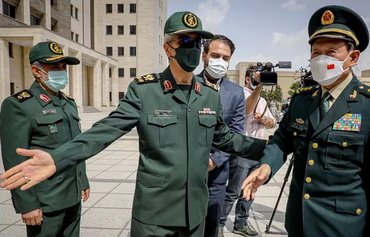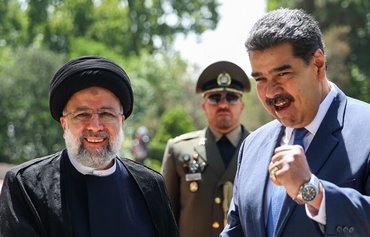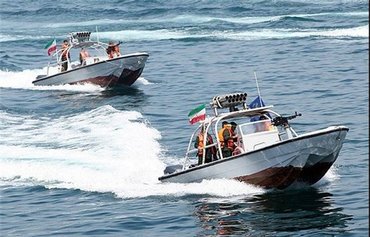Iranian forces seized a Panama-flagged oil tanker in the Strait of Hormuz early Wednesday (May 3) in the second such incident in less than a week, as hardline Iranian President Ebrahim Raisi concluded a provocative visit to Syria.
The tanker, Niovi, was sailing from Dubai towards the Emirati port of Fujairah when it was stopped by Iran's Islamic Revolutionary Guard Corps Navy (IRGCN) at approximately 6.20am local time, the US Navy said.
"A dozen IRGCN fast-attack craft swarmed the vessel in the middle of the strait," said a statement from the US Navy's Bahrain-based 5th Fleet.
"The IRGCN subsequently forced the oil tanker to reverse course and head toward Iranian territorial waters off the coast of Bandar Abbas, Iran," it said.
![A screenshot from a video shows fast-attack craft from Iran's IRGC Navy swarming Panama-flagged oil tanker Niovi as it transits the Strait of Hormuz on May 3. [US Navy]](/cnmi_di/images/2023/05/04/41998-iran-attack-boats-600_384.jpg)
A screenshot from a video shows fast-attack craft from Iran's IRGC Navy swarming Panama-flagged oil tanker Niovi as it transits the Strait of Hormuz on May 3. [US Navy]
![A billboard with pictures of Iranian President Ebrahim Raisi and Syrian President Bashar al-Assad is seen in Damascus on May 3. [Louai Beshara/AFP]](/cnmi_di/images/2023/05/04/41999-Raisi-Assad-billboard-600_384.jpg)
A billboard with pictures of Iranian President Ebrahim Raisi and Syrian President Bashar al-Assad is seen in Damascus on May 3. [Louai Beshara/AFP]
Iran has confirmed the seizure "following an order from the judiciary", the judiciary's Mizan Online news website said.
The MarineTraffic tracking website last reported the tanker in the Gulf of Oman, where six days earlier, Iran's navy seized a Marshall Islands-flagged oil tanker.
Maritime security company Ambrey said the Marshall Islands-flagged tanker had been boarded via helicopter, Asharq al-Awsat reported April 29.
"The vessel did not show any signs of conducting evasive manoeuvres before the incident," the security company said.
Iran has harassed or attacked 15 internationally flagged merchant vessels in Gulf waters over the past two years, the US Navy said, calling its actions "contrary to international law and disruptive to regional security and stability".
"Iran's continued harassment of vessels and interference with navigational rights in regional waters are unwarranted, irresponsible and a present threat to maritime security and the global economy," it added.
Increasing co-operation between Iran, Syria
The latest tanker seizure came as Raisi on Wednesday concluded a visit to Damascus -- the first by an Iranian president since the Syrian conflict began.
Raisi's visit followed close on the heels of a visit to Lebanon by Iranian foreign minister Hossein Amir-Abdollahian, who expressed staunch support for Hizbullah, which the IRGC has supplied with armed drones, weapons and training.
Tehran has provided economic, political and military support to both Hizbullah and Syria, helping Syrian President Bashar al-Assad's regime claw back lost territory as it seeks to focus on reconstruction.
Syria and Iran, which remain under heavy sanctions, reportedly held consultations to strengthen and improve economic, political and security relations.
Al-Assad and Raisi signed memoranda of understanding on "long-term strategic co-operation", covering oil, aviation, railways and agriculture, SANA said.
The large Iranian delegation included the ministers of foreign affairs, defence, oil, roads and urban development as well as telecommunications.
Iranian government spokesman Ali Bahadori Jahromi said Tuesday that "both countries are ready for the highest level of co-operation".
"The purpose of this trip is economic," he said, adding that the two countries could also "co-operate" on Syria's reconstruction.
Together hamstrung by sanctions
In January 2019, Syria and Iran signed 11 agreements including on "long-term strategic economic co-operation".
Many of these agreements are lopsided, Syrian economist and Damascus University lecturer Mahmoud Mustafa told Al-Mashareq, with Iran standing to benefit the most from them.
According to an Atlantic Council report published in February 2020, "there is almost no possibility that Syria was paying off any of the debt back to Iran, as its government struggles to cover its expenses".
At the same time, Iranian commercial expectations in Syria have been unmet, it added, citing an Iranian market share of just 3% between 2010 and 2017.
"Iran is unlikely to benefit from any reconstruction projects before the sanctions on al-Assad's regime are lifted. The competition is likely to be fiercer if sanctions on Syria are lifted and other countries, such as China, enter the scene," it said.
In June 2020, the most wide-ranging US sanctions ever applied against Syria went into effect under the Caesar Syria Civilian Protection Act of 2019.
The Caesar Act penalises companies worldwide that deal with the al-Assad regime and blocks US reconstruction aid until perpetrators of abuses in Syria's war are brought to justice.
"The funds that will go to the reconstruction of Syria are subject to many international controls," Iranian affairs researcher Fathi al-Sayed of al-Sharq Centre for Regional and Strategic Studies told Al-Mashareq in 2021.
"Iran, Russia and Syria cannot in any way act alone in this regard," he said.
He pointed out that reconstruction projects require collective international approval, he said, which would deprive the Iranian side of the dream of recouping any money expended to bolster the Iranian treasury.
"Iran is essentially unable to implement these projects alone," he said.

![Syria's President Bashar al-Assad shakes hands with his Iranian counterpart Ebrahim Raisi in Damascus on May 3. [Louai Beshara/AFP]](/cnmi_di/images/2023/05/04/41997-raisi-assad-600_384.jpg)






